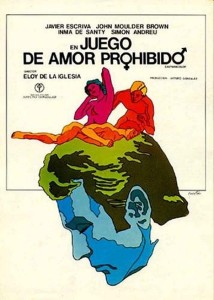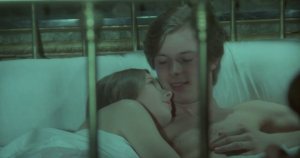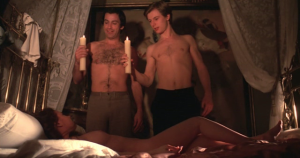Forbidden Love Games (Juego De Amor Prohibido) (Eloy de la Iglesia) (1975)
Forbidden Love Games (Juego De Amor Prohibido)
Directed by: Eloy de la Iglesia in 1975
Subtitles for the movie can be found at the end of the page (link section)

Two teenage students, Miguel and Julia, decide to run away from home during the Easter holidays, immediately after their last day of school. They hitch-hike and they get a lift from their austere literature teacher, Don Luis, an aristocrat who is living off his wealth and teaches at school only for his leisure. Don Luis, who lives with an ambiguous servant, Jaime, who once was his student. Don Luis is strangely supportive with the two and when they are about to get caught by the police, he offers them to stay at his mansion, only to imprison them and educate them with the force into his own ways.
This very interesting movie, shot by the very little known (at least outside of Spain, I don’t know if inside his home country he is more popular) Spanish director Eloy de la Iglesia in 1975, is an ambitious effort to mix the exploitation/erotic giallo/thriller subgenre, at the times quite popular in Europe, with a generational and political message. The movie has quite high references, from Losey’s “The Servant” and Wyler’s “The Collector”, and was shot a couple of months before the death of Francisco Franco and the collapse of his strict regime.
The movie, under the form of a claustrophobic thriller with strong sadian undertones, wishes to explore the relationship between the master, a decadent aristocrat with superhomistic ideas, a clear banner for the conservative regime that at the times was at power in Spain, his servant, a sinister young man with an obscure past and his/their victims, a young couple of the flower power generation who stand for the new generation with a rebellious streak and anti-autoritarian ideas.
The pace is quite slow and takes it’s time to investigate and develop the psychology of all the characters and investigate the relationship between them, with a strong emphasis on how, on a subtle level, there is a tacit bond and complicity between all of them which passess from the common struggle for power, domination and control.
In this aspect, Iglesia had quite a strong intuition: the new generation isn’t necessarily better than the old one if the inner chain of power, and the wish for it, isn’t broken, even if the young generation carries new and more open ideas.
He’s very original in developing this intuition, even if the idea that victims and tormentors can easily and suddendly exchange roles isn’t new, because it comes off very subtly and gradually. Even if the true colors of each of the characters involved come clearly exposed only in the last part of the movie, the viewer who pays attention to details can guess how the people involved will develop quite early in the movie.
Somehow, the reversal of roles and the demise of events, is a conservative passage and not a revolution or a change of the situation. In this, Iglesia is very bitter and pessimistic, but also quite prophetic, and has the courage to go against the grain.
Even the theme of sexual liberation, at the time a very strong current in juvenile counter-culture, is viewed with skepticism, if detached from the rest, since it doesn’t obstacle or oppose the power play but, on the contrary, becomes a new mean to manage it. The bisexual love triangle which ensues from the movie events is not an happening of joy and freedom but the instrument of domination and the bars of a new prison.
In fact, the three refuse life like Don Luis.
The aristocrat wanted to mold people and the world on his Wagnerian ideals of grandiosity and discipline, and thus ended in refusing the real world for a sadian fantasy kindergarten, the three youngsters are skeptic about the outside world and prefer to lounge in the world of commodity and fantasy, into an illusion of an order, than to exit and face the world.
Don Luis’s ideals had won, in a way. It’s not a chance that after the wild joyous party, a restoration, ensued by the new keeper of power, the strong-willed and cold hearted Julia (played by Irma de Sanctis, who died only 30 years old in 1989) to whom the now impotent and beaten down Don Luis passes the rein of the game, switching from being a sadist to being a masochist (a development already hinted in the first part of the movie).
On a side, de la Iglesia advocates the need for a sexual liberation: in a sequence in which the police investigates the couple’s disappearance at school, there is a strong retitency in the students in explaining the true motifs behind the escape of the two youngsters, until one of them exposes it clearly, the desire of a free and joyful sexual relation. De la Iglesia clearly despises the hypocrisy and the forced silence which is surrounding the Spanish society of the times, where high artistic, intellectual and spiritual values are praised by word only to be denied in real life and relationship, thus being only a white tomb, nice from outside and rotten inside. The main symbol of this is, of course, Don Luis, in public a well read and respectable man and a violent sadist in private.
On the other side, de la Iglesia says that it’s not enough and that the power relationship at the base of the totalitarian oppression, is at first rooted deep in the mind and in the true values, often hidden to the one who carries them, that one has inside. Freedom is at first inner, only after outer. Otherwise, there is only a change of form but not of substance.
An original stance to take, expecially in the seventies, where there was much more hope in the future than the present age.
For this peculiar capacity of understand the spirit of it’s times, this movie is particulary interesting. But even viewed as a “common” erotic thriller, apart from it’s symbolic value, it has some very good cards to play.
At first, it’s cast, talented and very much suited for the movie. Then, the lush and refined cinematography, without becoming boring or redundant with a good pacing, with the proper attention to details and symbols. Finally, it’s very suited classical musical score, which gives at the whole story a subtle touch of melancholy and a sense of necessity, like somehow things could and couldn’t go another way at the same time.
“Forbidden Love Games” is also very balanced under the exploitative side. There isn’t any explicit gore, but a constant sense of tension and psychological violence is palpable. There aren’t a lot of nude scenes (apart, maybe, one very intense scene in which the three play with wax and the beautiful naked body of Julia) but the erotic tension, both “straight” and sadic, is consistent and very thick.
There is also a strong presence of homoerotic tension and a strong, dominating, feminine character. Two elements that seems to recur in de la Iglesia works and deserves more investigation. Sadly, I haven’t watched a sufficient number of his works to write something more about it. Maybe I’ll do it in the future, if I will have the occasion and time to do so.
This obscure movie, definitevely deserves a watch if you like the genre. I don’t know about any dubbing in languages other than Spanish but fortunately there are English subs available for it (which I included at the bottom of the page, for the viewer’s commodity).
Links
IMDB page for Juegos De Amor Prohibido
Subtitles (.srt format) Important! These subtitles are not made by ne. I’ve just found them online.


